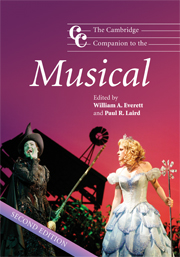Book contents
- Frontmatter
- Part I Adaptations and transformations: before 1940
- Part II Maturations and formulations: 1940–1970
- Part III Evolutions and integrations: after 1970
- Part IV Legacies and transformations
- 17 Why do they start to sing and dance all of a sudden? Examining the film musical
- 18 Revisiting classic musicals: revivals, films, television and recordings
- 19 The creation of a Broadway musical: Stephen Schwartz, Winnie Holzman, and Wicked
- Notes
- Select bibliography
- Index
19 - The creation of a Broadway musical: Stephen Schwartz, Winnie Holzman, and Wicked
from Part IV - Legacies and transformations
Published online by Cambridge University Press: 28 September 2011
- Frontmatter
- Part I Adaptations and transformations: before 1940
- Part II Maturations and formulations: 1940–1970
- Part III Evolutions and integrations: after 1970
- Part IV Legacies and transformations
- 17 Why do they start to sing and dance all of a sudden? Examining the film musical
- 18 Revisiting classic musicals: revivals, films, television and recordings
- 19 The creation of a Broadway musical: Stephen Schwartz, Winnie Holzman, and Wicked
- Notes
- Select bibliography
- Index
Summary
The creation of Wicked began when Stephen Schwartz first encountered Gregory Maguire's fascinating retelling of The Wizard of Oz from the Wicked Witch of the West's viewpoint. A friend told Schwartz about the novel while they were on a snorkelling trip in Hawaii. The composer hears a bell when he encounters a good concept for a musical, and he reports ‘that bell went off as soon as I heard the title’. Back in Los Angeles, he asked his lawyer to investigate who owned the rights to Wicked. They followed a winding path that ended with Marc Platt, head of Universal Pictures, who owned the film rights and awaited the second draft of a screenplay.
Schwartz hoped to convince Platt that Wicked would make a better stage musical than a film. He recalls: ‘I really believed I knew how to do it and wanted it very much.’ After meetings with lower-level executives, Schwartz finally made his case to Platt personally about a year later. He feels fortunate to have dealt with Platt, who liked musical theatre and had appeared in Schwartz's Pippin while in college. Platt asked for time to consider it; he gave the composer/lyricist permission for the project in 1997 or 1998. At one point, Platt considered doing both the stage musical and a non-musical film.
Schwartz had already decided to ask Winnie Holzman to write the book. He had loved her television series My So-Called Life, which included convincing young female characters. With Wicked dominated by Elphaba and Galinda, this was crucial. Schwartz had met Holzman years before when she was a student in the New York University musical theatre writing programme, for which he did masterclasses. After both had discovered Wicked, Disney brought Schwartz and Holzman together to discuss another project. Talk at lunch turned to the novel and Schwartz mentioned he hoped to make a musical out of it. Holzman knew of the book and had thought it would make a good movie because of its ‘brilliant premise’, but she abandoned the idea when she learned that Universal had the rights.
- Type
- Chapter
- Information
- The Cambridge Companion to the Musical , pp. 340 - 352Publisher: Cambridge University PressPrint publication year: 2008
- 1
- Cited by

